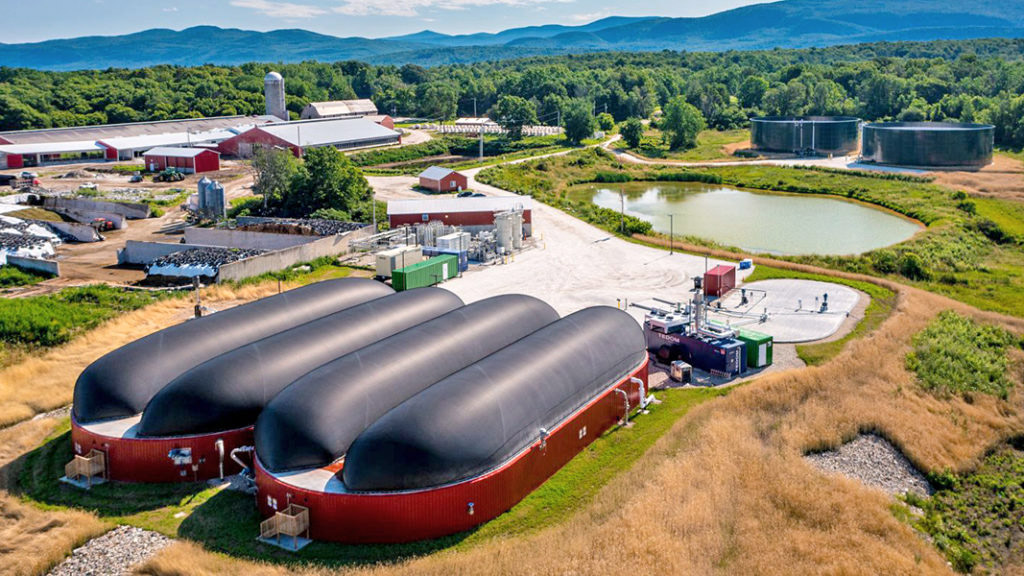Top: Vanguard Renewables’ codigestion facility located on the Goodrich Family Farm, a 900-head dairy in Salisbury, Vermont. Photo courtesy of Vanguard Renewables.
Massachusetts-based Vanguard Renewables, an anaerobic digester developer founded in 2014, announced on July 20 that a fund managed by BlackRock Real Assets has acquired the company from Vision Ridge Partners, the original majority investor in the company. BlackRock Real Assets is the real estate and infrastructure investment arm of BlackRock, an investment management company. According to an article in the Boston Globe, the deal is valued at $700 million. “We are pleased to invest in Vanguard Renewables, a leading producer of renewable natural gas (RNG) from agriculture and food waste in the U.S., supported by long-term contracts,” said Mark Florian, Head of Diversified Infrastructure, BlackRock Real Assets. “Renewable natural gas is an attractive and fast-growing market that provides decarbonization solutions for both the provider of the waste, as well as the natural gas consumer. We look forward to partnering with Vanguard Renewables’ experienced management team to support the company’s strong growth momentum.”
Vanguard Renewables has two business lines: Vanguard Organics and Vanguard Ag. Vanguard Organics’ Farm Powered® anaerobic codigestion process converts inedible food and beverage waste and dairy manure into RNG and liquid low-carbon fertilizer. The company owns and operates digesters on five dairy farms in Massachusetts and one in Vermont, all designed to codigest food waste and manure. Vanguard Ag, developed in partnership with Dominion Energy in 2019, converts manure into RNG. Vanguard also operates a food and beverage waste depackaging facility in Agawam, Massachusetts, which supplies slurried food waste to its farm digesters. BlackRock Real Assets will partner with Vanguard Renewables’ management team to drive its next phase of growth, including its plans to commission more than 100 anaerobic digesters to produce RNG across the country by 2026.
Other recent RNG-related news includes:
• U.S. Sens. Mark R. Warner (D-VA) and Richard Burr (R-NC) introduced Senate Bill 4568, the Renewable Natural Gas Incentive Act, bipartisan legislation to provide a tax credit for heavy-duty vehicles that use RNG. The legislation proposes to “amend the Internal Revenue Code of 1986 to promote the increased use of RNG, to reduce greenhouse gas emissions and other harmful transportation-related emissions that contribute to poor air quality, and to increase job creation and economic opportunity throughout the United States,” notes the bill’s preamble. Previously, RNG received a lower tax credit than similar transportation fuels, despite its ultra-low emissions and ability to deliver economic growth as a scalable alternative energy source, according to S. 4568. The Renewable Natural Gas Incentive Act would create a $1.00/gallon tax credit for sellers of RNG used for transportation.
• WEC Energy Group received approval from the Wisconsin Public Service Commission in mid-July for its $75 million pilot program to replace some of its natural gas supply with RNG from local farms. WEC Energy Group is the state’s largest utility company. According to Wisconsin State Journal, the pilot is “intended to help its utilities meet their gas supply needs while reducing greenhouse gas emissions, providing farmers with a new revenue stream and reducing the risk of groundwater contamination.” The approval allows digesters to hook up directly to the gas distribution network rather than having to haul pressurized gas to an interstate pipeline portal, such as the one installed at the Dane County (WI) landfill. “The utility will pay for construction, operation and maintenance of facilities to connect digesters to its local distribution system and participating customers — either a farm or third-party digester — would contract to sell the gas at a discounted price for 10 years,” reports the Journal. “The digesters will retain the renewable fuel credits, which they can sell. At the end of the contract, digesters could continue selling the gas to the utility at market prices. The pilot program is limited to 15 participants. Each interconnection is expected to cost between $2 million and $5 million, which the utility says will be offset by reduced fuel costs.”












